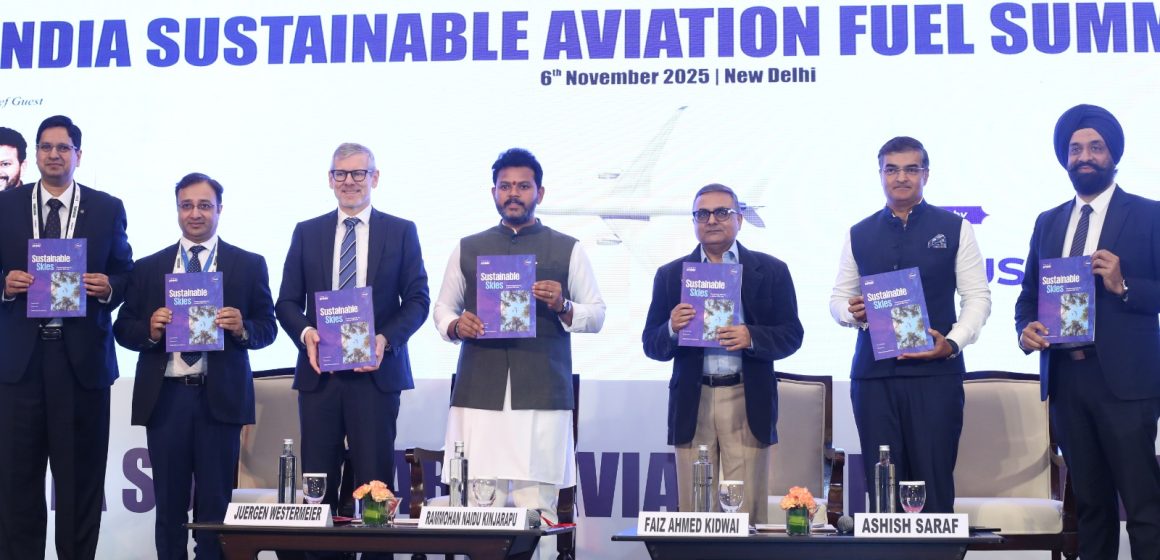The Union Civil Aviation Minister highlighted the urgency of SAF adoption, with India’s ATF consumption projected to reach 15-16 million tonnes by 2030 and 30-31 million tonnes by 2040.
As India’s aviation sector accelerates, with rising airport capacity, flight volumes and passenger traffic, Union Civil Aviation Minister Kinjarapu Ram Mohan Naidu has announced that the government will shortly release the policy on sustainable aviation fuel (SAF), marking a critical step towards decarbonising air transport.
Speaking at the India Sustainable Aviation Fuel Summit, jointly organised by FICCI and the Ministry of Civil Aviation, Naidu said, “The [Civil Aviation] Ministry has been taking robust steps to speed up the SAF movement, and we are committed to releasing the SAF policy soon.”
He noted that global aviation is expanding faster than most transport segments, driven by globalisation and rising demand. Citing India’s domestic growth, he said that in the past nine years, the country has added 90 airports and 400 aircraft, with scheduled flight movements up by 78 per cent. The government plans to add 50 airports in the next five years and 200 over the next two decades, targeting 500 million annual passengers and a 10-12 per cent growth rate over the next ten years. At this pace, aviation’s share in transport emissions could rise from 5 per cent to 8-10 per cent by 2030.
“Aviation has truly become the growth engine for mobility and businesses worldwide,” he said, adding that this expansion demands greater clarity, commitment and collaboration.
Naidu highlighted the urgency of SAF adoption, with aviation turbine fuel (ATF) consumption projected to reach 15-16 million tonnes (MT) by 2030 and 30-31 MT by 2040.
“The solution here for all of us is SAF. With the potential to reduce carbon dioxide emissions by up to 80 per cent compared to conventional jet fuels, SAF offers a direct way to reduce the aviation sector’s carbon footprint.”
He was quick to point out that India’s agricultural strength—over 750 million tonnes of biomass—positions it to become a global leader in SAF production. This transition could reduce the crude oil import bill by $5-7 billion annually and create up to 1 million green jobs across the SAF value chain.
Naidu also released the FICCI-KPMG report, Sustainable Skies: Positioning India as a Global SAF Hub, which recommends a systems-level approach integrating policy design, innovative business models and coordinated industrialisation to transform India into a global SAF supplier.
Towards Cleaner Flights
Other speakers at the event also emphasised the urgency of tackling carbon emissions and highlighted India’s potential leadership role.
Faiz Ahmed Kidwai, Director General of the aviation regulatory body, the Directorate General of Civil Aviation (DGCA), said decarbonisation is a shared global responsibility.
“Our ambition is to achieve a 5 per cent SAF blending target by 2030, which is not just a goal but a declaration of intent to lead by example.”
Jürgen Westermeier, Chairman of FICCI’s National Civil Aviation Committee and President & Managing Director of Airbus India & South Asia, called SAF a transformative opportunity.
“Beyond environmental targets, SAF can be a powerful economic enabler. Developing a domestic SAF industry will enhance India’s energy security and fuel sovereignty.”
Ashish Saraf, Co-Chairman of FICCI’s Civil Aviation Committee and Vice President & Country Head, India at Pratt & Whitney, said SAF could reduce emissions by up to two-thirds.
“India is uniquely positioned to lead globally and become an export hub for SAF.”
Per the draft Sustainable Aviation Fuel (SAF) Policy released in May 2024, India has targeted to increase the SAF component to 1 per cent by 2027, 2 per cent by 2028, and 5 per cent by 2030.
– Manish Pant


